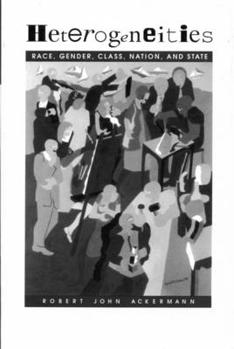Heterogeneities: Race, Gender, Class, Nation, and State
In this book, a distinguished philosopher offers a provocative analysis of the hidden assumptions that lie at the heart of contemporary social ideology. Robert John Ackermann argues that all social life is intrinsically heterogeneous and that such homogeneous constructs as race, gender, class, nation, and state are necessarily artificial. In the course of his inquiry, he discusses what we mean when we invoke these terms and explores the intellectual implications and concrete consequences of their everyday use. Although Ackermann's approach is philosophical, his arguments are grounded in his personal experience - from encounters with the subtle workings of racism and sexism to active participation in local government. He urges his readers to draw on their experiences to test the validity of his conclusions. In his view, only by breaking down the traditional distinction between private perception and public authority, "subjective" and "objective" knowledge, can the insights of philosophy prove useful in promoting meaningful social change. In a final chapter, Ackermann stresses the need to combine social theory with political practice. Against the advocates of universal rationalism on the one hand, and the champions of multiculturalism on the other, he makes the case for a genuinely democratic politics of inclusion.
Format:Paperback
Language:English
ISBN:1558490140
ISBN13:9781558490147
Release Date:May 1996
Publisher:University of Massachusetts Press
Length:240 Pages
Weight:0.82 lbs.
Dimensions:0.6" x 6.0" x 9.0"
Customer Reviews
0 rating





